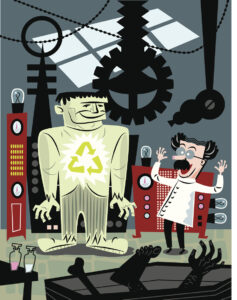For all the confusion caused by President Biden’s recent declaration that “the pandemic is over,” and the familiar sight of administration officials rushing to qualify his comment, it raises a question: where does the Covid emergency actually stand?
Having gone from draconian lockdowns to a summer of travel chaos in just over two years — with lots of political squabbling in between — it has been easy to lose track of both the remaining dangers and the precautions many health experts believe are needed going forward.
Strictly speaking, Covid is still very much with us. The average number of daily cases in the US has floated between 50,000 and 60,000 since April of this year and the death toll remains fairly constant at 400 per day. According to the Centers for Disease Control and Prevention (CDC), tens of thousands more across the country continue to be hospitalized for the virus, and the possibility of these numbers spiking in the colder months is high. Despite the widespread sense that the “the worst is over,” more than one million people around the world have died of Covid this year alone.
It also seems that the Omicron variant of the coronavirus, which first appeared in the fall of 2021, is proving remarkably adaptable, as it has produced the most significant offshoots of the virus ever since. One is the still rare but disturbing subvariant BA.2.75.2, with a superior capacity to evade immune responses. “Based on what’s being detected at the moment, it’s looking like the future SARS-CoV-2 (the cause of Covid-19) will evolve from Omicron,” says virologist David Robertson of the University of Glasgow.
On the other hand, vaccines and antivirals have clearly left us in a better place than we were at the height of the pandemic, which thus far has infected 606 million people worldwide and killed just over 1 percent (6.5 million) of them. The risk of serious illness has declined to the point where the majority of Americans have comfortably resumed their pre-Covid routines, and two thirds only occasionally or never wear a mask in public spaces. At the same time, drug companies have perfected the rapid manufacture of variant-specific booster shots.
Given the legitimate possibility that a powerful strain of the coronavirus could theoretically emerge in coming months, most public health officials feel that those policymakers claiming we must just learn to “live with the virus” are being far too cavalier. The predominant fear of experts is that over time even vulnerable populations, such as the sick and elderly, might neglect an advisable shot. “If you say the pandemic is over with, why would people need to get these boosters?” notes Michael Osterholm, director of the Center for Infectious Disease Research and Policy at the University of Minnesota. “We’re already hearing that from the public.”
There has also been some nervousness among many physicians in the wake of the CDC’s announcement, just days after Biden’s “Covid’s over” statement, that universal masking in healthcare settings will no longer be required. Dr. Jeremy Faust of Brigham and Women’s Hospital (Harvard University’s second largest teaching hospital) calls the change “terrible policy” and “a life-threatening change for at-risk individuals.”
At the very least, says Dr. Michael L. Barnett of the Harvard T.H. Chan School of Public Health, masking should still be required of those healthcare workers who interact with seniors. “It makes [no] sense to me to be permissive with nursing homes, which is the most vulnerable place in the pandemic. You could make a better case to relax anywhere except nursing homes.”
But having seen how pandemic fatigue has eroded the public’s willingness to get repeated vaccinations and mask up — only 34 percent of people over 50 have gotten their second booster — the medical community is increasingly focused on normalizing Covid boosters as part of people’s regular health routines. The goal of many experts is to institutionalize something akin to the annual flu shot, even though it is not yet clear that immunity to Covid requires the same inoculation schedule as influenza.
Health leaders like Dr. Bob Wachter, chair of the Department of Medicine at the University of California San Francisco, say they like the idea of pairing a Covid booster with the fall flu shot, especially for patients who are not high-risk. This “doesn’t mean we KNOW [the annual] shot will prevent transmission for a year,” he recently tweeted. But it “DOES mean it’ll likely lower odds of a SEVERE case for a year.” By publicly framing the Covid booster as something one just automatically gets at the same time one receives the flu shot, Wacher believes it will “bump up” inoculation compliance.
If health officials agree on one lesson from the pandemic, it is that locking down in response to any future outbreak should be avoided as much as possible. Not only has it become clear that mass quarantines have unacceptable economic, psychological, and in the case of children educational downsides, but they seriously retard development of the most effective long-term Covid defense: herd immunity.
In China, which has implemented the strictest and most efficient lockdowns, only 1 percent of the population has achieved natural immunity to the coronavirus. But in the US, where an estimated 95 percent of residents have at some point been infected, the resistance to a major resurgence is much stronger.
Considering what we have learned to date about Covid, is it enough for President Biden or anyone else to make a reliable statement about where humanity’s relationship with the virus presently stands? “It’s probably fair to say most of the world is moving beyond the emergency phase of the pandemic response,” says Dr. Michael Head, senior research fellow in global health at Southampton University. But given how rapidly and unpredictably the coronavirus has evolved, Dr. Head also knows that future waves of infections in different parts of the globe, caused either by subvariants of Omicron or by entirely different variants, are possible. And how dangerous they may ultimately prove is far from certain.





